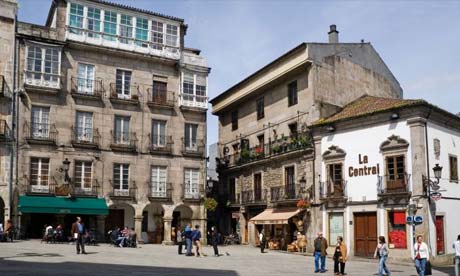I promised myself when I started writing this blog to always start with the positive things about a book. Well, Water-blue Eyes is short. Um… can’t think of much else at the moment.
 This book is from 2006 originally having won the Brigada 21 Prize for best first crime novel. Due to being unfortunately monolingual, I read the English translation. I generally shy away from translated works, as most of them in the genre tend to be bleak Scandinavian thrillers that have never really clicked with me (well, the first chapters didn’t anyway), but as, thanks to my good lady wife, I’ve spent some amazing times in Galicia, I felt that I couldn’t pass up a book set in Vigo.
This book is from 2006 originally having won the Brigada 21 Prize for best first crime novel. Due to being unfortunately monolingual, I read the English translation. I generally shy away from translated works, as most of them in the genre tend to be bleak Scandinavian thrillers that have never really clicked with me (well, the first chapters didn’t anyway), but as, thanks to my good lady wife, I’ve spent some amazing times in Galicia, I felt that I couldn’t pass up a book set in Vigo.
 The plot concerns Inspector Leo Caldas and his investigation into the murder of a saxophonist, found tied to a bed with (brace yourself) his genitals burned and shrivelled by the injection of concentrated formaldehyde. Caldas investigates and I wish I could summon up the enthusiasm to recount the plot basics in any more detail.
The plot concerns Inspector Leo Caldas and his investigation into the murder of a saxophonist, found tied to a bed with (brace yourself) his genitals burned and shrivelled by the injection of concentrated formaldehyde. Caldas investigates and I wish I could summon up the enthusiasm to recount the plot basics in any more detail.
So what’s the problem here? It’s hard to say, given it could be the source material or the translation of it, but I didn’t find the book engaging. It took me four days to read 160 pages. That’s very slow for me. On the translation side of things, there are parts that annoy me, in particular the complete lack of any Spanish phrases in the dialogue. I understand this choice, but the use of particularly English words like “boss” and certain naughty words seemed jarring to me. There seemed to me to be a lack of atmosphere – Galicia is a beautiful part of the country, but I found the descriptions quite cold. Apart from the descriptions of the goose barnacles though – that just made me hungry.
I can’t blame the translator for the plot and characters though. Caldas’ sergeant, Estévez, is as repellent a good guy as you’ll ever meet and gets absolutely no come-uppance for his violent and homophobic actions, let alone kicking a cute dog at one point. His presence had me reading faster just to find a section of the book that he wasn’t in. And, of course, for me it all comes down to the plot.
“Villar’s prose is brilliantly concise” El Pais.
This is a problem when what could have been an intelligent plot to frame someone for the murder is raced through, both in execution and explanation. A particular cheat is used when Caldas mentions that he missed something when examining the scene of the crime – mystery speak for the reader has missed something – but going back to it, the detail in question isn’t there, and you won’t spot what passes for a clue unless you’re an expert in German philosophy.
I usually like to summarise the good points and not dwell on the bad, so I would recommend anyone who still wants to read this to learn Spanish and read the original – that would cut out some of the problems. But if the reader out there is looking for a great crime novel, browse through the rest of my blog. There are much better things out there.

[…] In Search of the Classic Mystery Novel Spoiler Free Reviews of Fair Play Detective Fiction Skip to content HomeAbout the author ← Water-blue Eyes (Ojos de Agua) by Domingo Villar […]
LikeLike
[…] down to The Nine Giants by Edward Marston, Water-Blue Eyes (Ojos de Agua) by Domingo Villar and The False Inspector Dew by Peter Lovesey. Yes, I know everybody else in the world loves the […]
LikeLike
[…] eleventh Montalbano book, translated from the Italian. The last translated book that I reviewed, Water-Blue Eyes, failed to satisfy me, so would this […]
LikeLike